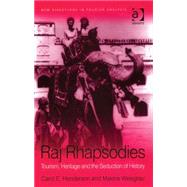- ISBN: 9780754670674 | 0754670678
- Cover: Hardcover
- Copyright: 6/28/2007
Heritage is a prized cultural commodity in the marketing of tourism destinations, with particular views of a place being promoted while others are downplayed. The representation of heritage in tourism as something that is static and timeless, derived since time immemorial from a distant past, is seductive. In Asia, a major part of the tourism market lies in the sale and consumption of highly orientalized images and versions of culture and history. This is particularly seen in India, where its northern state of Rajasthan has been successfully marketed as the nation's most heritage-laden, traditional and authentic. This draws heavily on the late nineteenth and early twentieth century years of British rule in India - the Raj. While in one sense, this neocolonial vision of Rajasthan is ennobling, highlighting moments of cultural pride, it also demeans by omiting and obscuring salient features of contemporary life. This book explores the cultural politics of tourism in this region through interdisciplinary perspectives. It questions what the locals think about tourism and how tourism impacts on local groups, and how the hegemonic images of India which attract tourists are confirmed by the tourist industry. It also examines issues of town planning, gender, domestic economic reform, religious pilgrimage, Muslim identity within a Hindu dominated polity and elite/non-elite politics. These tightly-woven essays suggest that toursim heritage narratives obscure economic and social fracture lines and that tourism silences diversity, privileges certain historic and contemporary discourses, recapitulates colonialism, and compels members of marginalized groups to collude in the representation of relationships of subordination.







